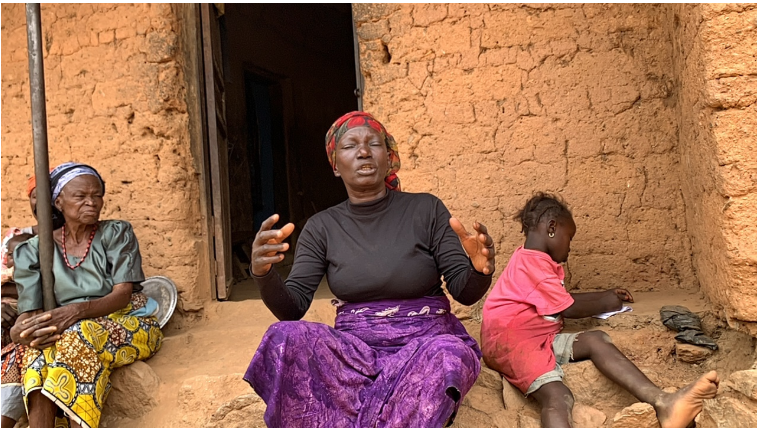Zike Tragedy: Survivors Mourn, Counting Lives Lost in Plateau Attack
The survivors of the Zike massacre in Plateau State, North-central Nigeria, recount the terrifying night, facing not only the pain of losing loved ones but also the struggle to find safety and justice. HumAngle visited some survivors.
It was a calm night until just before midnight. And when Mary John had dinner and shared tales by moonlight with her children and grandchildren that Sunday evening, she thought what would follow was sleep and farm work the next morning.
Mary said she heard the first gunshots pierce through the silence.
“Before we could go out, the house was already surrounded,” she said. She lives in a modest zinc-roofed mud house with three bedrooms and a sitting room. That night, inside were her son, daughter, daughter-in-law, and three grandchildren.
“They entered my son’s room,” she told HumAngle. “They were sleeping. They killed him, his two children, and cut off his wife’s hand. They also injured the other child. Then they entered the other room where my daughter was sleeping and they killed her too.”
The surviving daughter-in-law and grandchild are currently receiving treatment.
For reasons Mary still cannot explain, the attackers never broke into her room. “I wish they killed me with my children,” she said, then broke down in tears. She sat on the dusty floor, hand to chin, lost in grief. Nothing else seemed to matter—her world had fallen apart.
Mary’s son, Stephen, was 28 years old. One of her grandchildren, who was killed, Nenna, was just four. HumAngle could not confirm the names and ages of the two other victims in her family; Mary was too broken to continue speaking, and mourners around her had limited information. We cross-checked the details with the list of deceased persons released by the Irigwe Youth Movement (IYM), a local youth organisation. The names and ages matched.
As she wept in the darkness that night, Mary recounted, she heard the men chanting in her compound. Their voices filled the air, mixed with screams and gunfire. She told HumAngle that she could identify some of their words, including Fulfulde and English and another language she had never heard before.
Mary’s family, her children and grandchildren, were four of the 52 people massacred that night between April 13 and 14 in Zike village, Kimakpa/Kwall District, Bassa Local Government Area, Plateau State, North-central Nigeria.
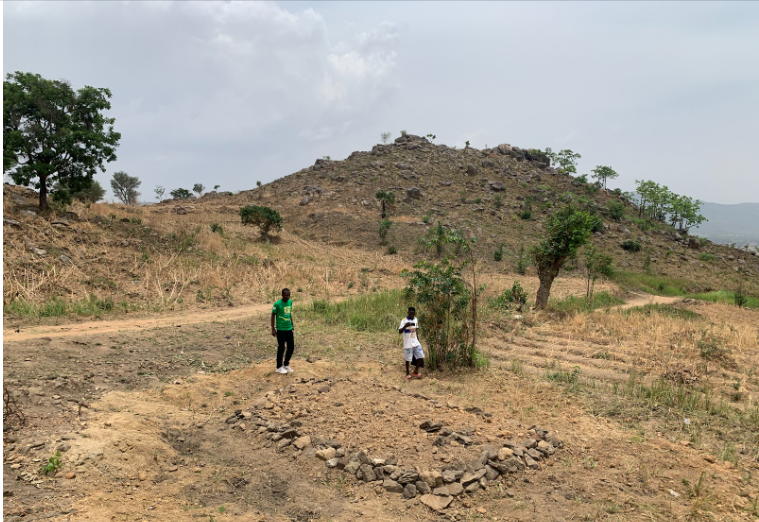
The massacre occurred just days after armed men launched similar attacks on villages in Bokkos, another local government area in Plateau State, leaving about 40 people dead.
A tragedy foretold
Locals say the attack could have been prevented. Joseph Chudu Yonkpa, IYM’s National Publicity Secretary, told HumAngle that several community organisations had received warnings of an impending attack.
The intelligence was shared with HumAngle around 9:50 p.m. that Sunday, and security forces were also notified. A military base is stationed less than a five-minute walk from the village. “We informed them,” Joseph said.
Operation Safe Haven, the military task force which manages the base, has yet to respond to HumAngle’s request for comment. At Kwall town, we met five military officers from the nearby base, but they declined to speak to HumAngle, citing restrictions. Vigilantes, however, told HumAngle that the five were on patrol at the market when the attack began but retreated, often blaming their limited firepower and the area’s rough terrain for their inadequate response. Plateau State Governor Caleb Mutfwang has previously alleged that some security personnel may be undermining efforts from within, referring to them as “fifth columnists.”
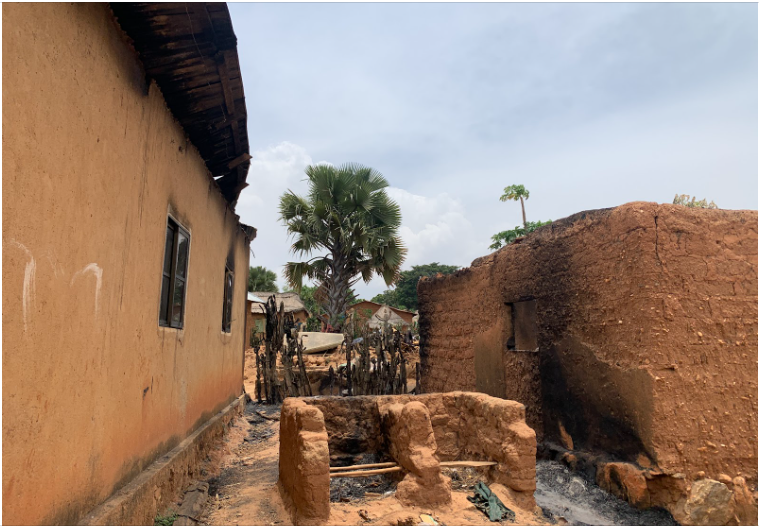
Zike had never been attacked before. So, when local vigilantes like John Abba received the threat alert, they redirected their limited resources, just two hunting rifles, to more remote areas that have suffered previous attacks. The Zimakpa district is spread thin, covering more than a dozen villages and hamlets.
“We assumed they wouldn’t come here,” said John, who lives near the Zimakpa District Palace.
Unlike Mary, John first heard screams even before the gunshots. According to him, when the attackers first came, they were going from house to house to slaughter or stab residents.
HumAngle reviewed images of the dead to confirm this claim. The bodies of some children as young as three bore machete wounds to the head. Many were killed in their sleep. Others were slaughtered as they tried to flee, caught in their compounds, on footpaths, or just outside their homes. Some escaped by hiding in the bush, on rooftops, or in trees. Others stayed inside, clinging to the hope that silence or locked doors might save them from the horror.
“When we came the next day, dead bodies were littered on the streets, inside buses, and in people’s homes,” said Joseph, who was at the forefront of the search and recovery of bodies.
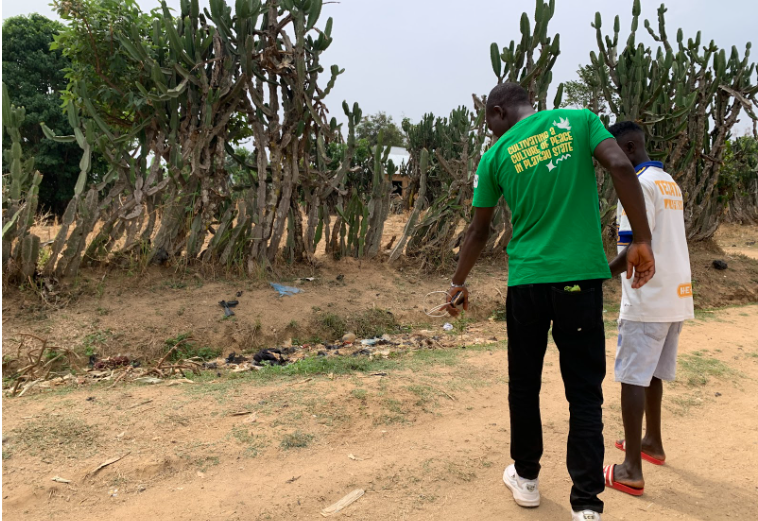
He rejected claims that “only 17” people were killed.
“That’s why we documented and published the names of the 51 we buried in the mass grave, and the other who later died in the hospital,” Joseph added, as he pointed to the gravesite.
Since January, Bassa has endured a series of isolated attacks. Some victims were killed while working on their farms; others were ambushed on the road. According to IYM data, 22 people have lost their lives in these attacks before the April 14 attack. HumAngle could not independently verify this data.
Disputed narratives
Luka Miri, District Head of Kimakpa, said the attackers were armed herders. “This is not the first time Irigwe land has suffered this,” he said.
In a state broadcast on April 16, Governor Mutfwang, said, “This is not random violence.”
“This is not an isolated conflict between farmers and herders. What we are witnessing is a systematic and premeditated campaign—one that seeks to displace, destabilise, and instil terror and fear in our people and communities,” he added.
President Bola Tinubu, in contrast, described the killings as a “communal clash”. Luka dismissed this framing: “If it were a clash, there would be casualties on both sides. People go to bed and are slaughtered in their sleep. This is about land. We have Muslims living peacefully among us—it’s not about religion.”
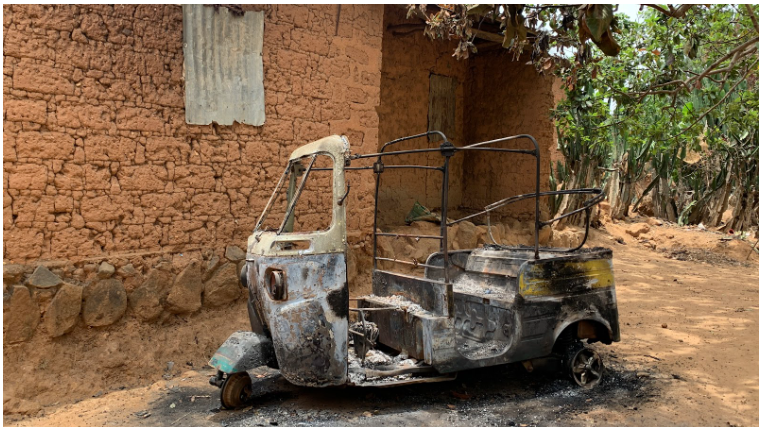
He alleged, without providing evidence, that the attackers came from neighbouring Kaduna State, northwestern Nigeria, a claim HumAngle could not independently verify. Zike shares a boundary with the state. From the mass gravesite, it took HumAngle about ten minutes on foot to reach the Plateau-Kaduna boundary. “The borders are porous; it is easy to come in and go out,” Joy Sunday, a Kimakpa resident and youth leader, said.
Previous reports by HumAngle have documented how terrorist groups have taken hold in parts of southern Kaduna, which has also experienced similar patterns of violence.
“Some have lived with us in the past and can even speak our language,” Luka said. “They use it to deceive us during attacks, luring people into the dark under the pretence of offering refuge and claiming they are one of us, then they kill them.”
Luka himself narrowly escaped the massacre. His house, one of the few in the community with a perimeter fence, may have been spared for that reason, he said. However, he and his household still fled, as homes barely a minute’s walk from his were attacked.
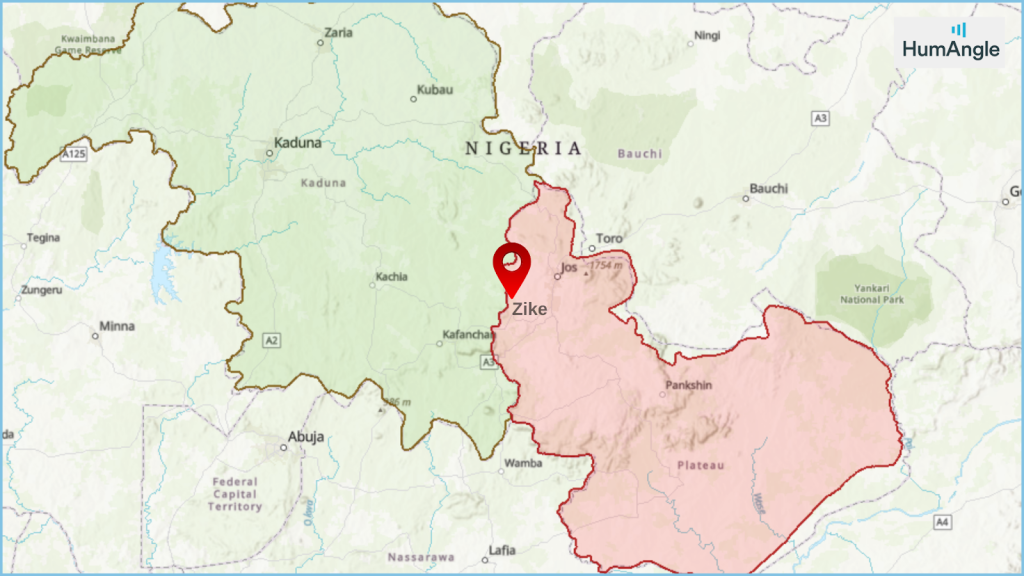
Meanwhile, herder communities in Plateau have long accused indigenous groups of cattle theft and unfair treatment. “Most of the problems start when our people resist attempts to rustle their cattle,” according to Garba Abdullahi, Plateau State chairperson of the Gan Allah Fulani Development Association.
The herders also claim that their cattle are sometimes poisoned.
Luka and several other residents who spoke to HumAngle said that Zike village currently has no herder community, as they have since left. “No one drove them away,” he claimed.
Just days after the Zike massacre, news broke that 36 cows belonging to a herder, Samaila Nuhu, were poisoned in a Bassa LGA community. It has been described as a reprisal attack. However, authorities say the incident is still under investigation. “While the government is deeply concerned about this report, it urges the public to remain calm and avoid speculations or narratives that may further inflame tensions or disrupt the peace in the area,” said Joyce Lohya Ramnap, the state Commissioner for Information and Communication.
Joy told HumAngle that cattle often graze on farmlands that have been treated with insecticides. But herders insist the poisoning is intentional.
A research study by the Department of Crop and Environmental Protection at the Joseph Sarwuan Tarka University (formerly Federal University of Agriculture), Makurdi, Benue State, in North-central Nigeria, notes that the use of insecticides on farmlands is a standard practice for pest control and crop protection. However, when livestock stray into these treated areas, they can be exposed to harmful chemicals. This underlines the need for clearly defined grazing routes and stronger community-based conflict resolution to prevent such unintended consequences.
IYM says more than 27,000 farms have been destroyed since the region’s cycle of violence, often referred to as “farmers-herders clash”, began in 2001. HumAngle could not independently verify these figures, and the number of affected cattle within the same period remains unknown.
Following the recent attacks in Bokkos and Bassa, the Coalition of Registered Fulani Organisations in Plateau State outlined a set of conditions for peace in the region. These include the removal of a sector commander in Bokkos, whom they accused of “incompetence and violation of military ethics,” as well as the disbandment of Operation Rainbow, a Plateau State government-run security outfit. Garba Abdullahi Muhammad, the chairperson of the coalition, revealed this during a press conference held in Kaduna.
A village in ashes, tears, and fear
Following the renewed wave of attacks in Plateau State, security patrols have increased in affected areas like Bassa and Bokkos. Top security officials, including the Chief of Army Staff, the Inspector General of Police, and the National Security Adviser, have made working visits to the state, assuring communities of improved safety.
However, no arrests have been made. The Plateau State government has rolled out several measures: a ban on night grazing, restrictions on cattle transport after dark, limits on motorcycle movement, and the reactivation of the Inter-Religious Council. It has also appointed a Special Envoy for Peace and established a Fact-Finding Committee to address the violence.
President Tinubu has also requested that the state government resolve the “underlying communal issues.”
Still, the wounds remain raw.
While the community continues to mourn their loved ones, they are also counting their material losses: the relics of the massacre stare them in the face. During a walk through the village, HumAngle saw collapsed roofs, blackened walls from smoke and fire, a burnt tricycle, and scorched barns that had once been filled with grain and other farm produce.
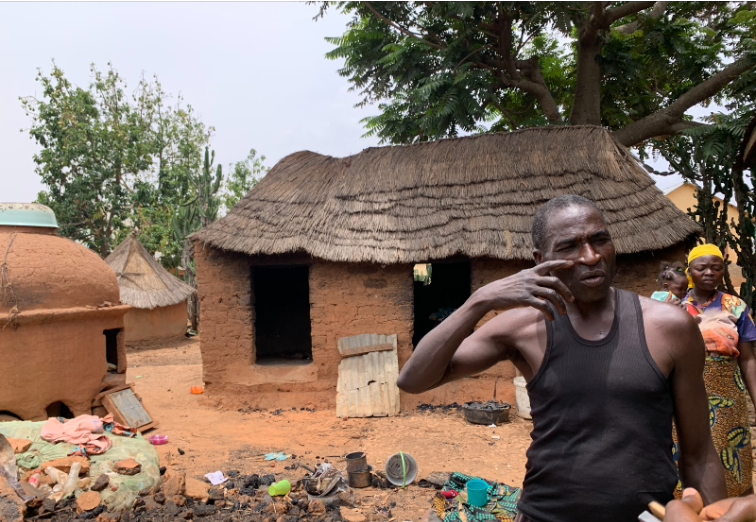
“Because we live at the far end from where the killings started, we fled into the bush,” said Dinaka Lugo, a local farmer, who returned to find his house and barn destroyed. The grains he had stored, worth hundreds of thousands of naira, had been reduced to ash.
Still, like many others, he remains resolute.
“We will continue with what they left,” he said.
His two sons were nearby, bent over a large trampoline mat, threshing what little grain they had managed to salvage. Elsewhere in the village, by the roadside, beneath trees, survivors huddled in groups, trading stories of that night: where they hid, who they lost, what they found when they returned.
The village stirred with quiet defiance. Women pounded grains beneath scorched branches, the steady thud of pestles cutting through the low murmur of voices. Ash hung thick in the air as men swept the blackened remains of what were once bedrooms, kitchens, and living rooms.
“We don’t have anywhere else to go,” said a community leader who declined to give his name. He once served on an Irigwe-Fulani peace and conflict resolution committee in Bassa. “This is home. We don’t want to live in IDP camps. We’d rather take our relatives and others into our homes when they are displaced.”
Still, the attack, along with the lingering threat, has forced other residents to flee. Some have begun relocating to urban centres like Jos, just an hour’s drive away.
‘Only God and government’
Governor Mutfwang has called on “traditional leaders and youth associations to reactivate local vigilante groups and organise night patrols in coordination with the security agencies. We must protect our communities while upholding the rule of law.”
Although local self-help groups already exist in some communities, including Kimakpa, the district head told HumAngle that they lack the necessary resources to function effectively. “Only God and the government can stop this. If they are honest, it is in their hands. We don’t have the money to equip the children, and we don’t have the resources,” he said.
“If the government doesn’t take action, we will become slaves in our land,” Mary said. She paused, but she couldn’t hold back the tears, even as other mourners tried to comfort her.
“We don’t have anything,” she wept. “We’re not safe in our own homes.”
The community of Zike in Plateau State, Nigeria, experienced a devastating attack between April 13 and 14, resulting in the death of 52 people, with affected victims ranging from young children to adults.
Despite prior warnings, the attack—characterized by home invasions and brutal killings—was not thwarted, and security forces reportedly failed to respond adequately.
This violence is not an isolated incident but part of ongoing tensions in the region, attributed to both ethnic and land-related conflicts.
Local self-help groups are under-resourced, highlighting the need for effective governmental intervention to safeguard the community.
Survivors face significant material losses and psychological trauma, with some residents seeking refuge elsewhere amidst increased security measures and ongoing investigations.
Support Our Journalism
There are millions of ordinary people affected by conflict in Africa whose stories are missing in the mainstream media. HumAngle is determined to tell those challenging and under-reported stories, hoping that the people impacted by these conflicts will find the safety and security they deserve.
To ensure that we continue to provide public service coverage, we have a small favour to ask you. We want you to be part of our journalistic endeavour by contributing a token to us.
Your donation will further promote a robust, free, and independent media.
Donate HereStay Closer To The Stories That Matter

